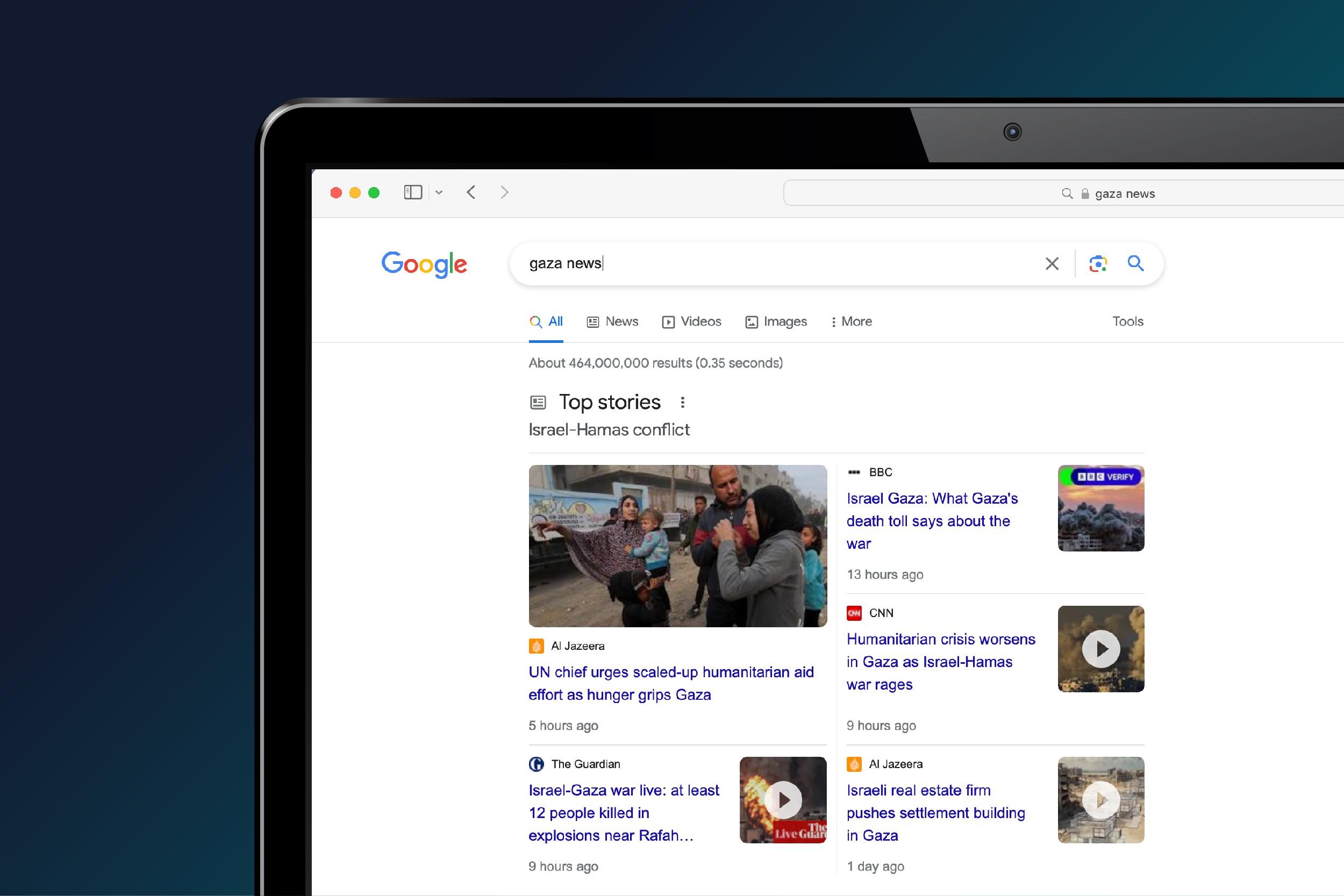Articles
Fact-checking
How misinformation and confirmation bias risk fueling the war in Gaza
Nick Newsom
Jan 26, 2024
This article was originally published by L'Orient Today.
As the war in Gaza rages toward its fifth month, the world is following the violence closely, but many are not considering all available information about events on the ground.
With the ICJ now set to conduct a lengthy investigation into South Africa's case alleging genocide by Israel in Gaza, a resolute focus on facts will help end the cycle of violence and ensure justice is eventually served.
At the start of November, the counter-disinformation platform I work for, DALIL, conducted a nationwide telephone survey of 332 people in Lebanon. We aimed to get a snapshot of how media coverage of the war is being consumed and of people’s vulnerability to false narratives.
The survey shows that media consumers in Lebanon have generally high levels of trust in the coverage of events in Gaza across a variety of platforms. Seventy-one percent have moderate, high or complete trust in social media as a source. That figure stands at 69 percent for television and radio coverage. Seventy-two percent say social media is having a mostly positive effect on the chance of the conflict being resolved.
At the same time, fewer than 10 percent of respondents say they know how to fact-check claims or that they are familiar with the work of fact-checking groups. In Lebanon, such groups include Chayyek, Sawab and Maharat News.
Since the start of the war, we have seen people making their minds up quickly about what they see, often without considering all available information.
Perhaps the most egregious example is US President Joe Biden's repeated promotion of the unsubstantiated claim that Hamas decapitated multiple babies on Oct. 7. Israeli newspaper Haaretz, citing sources including Israel's National Insurance Institute and the police, has reported that one baby was murdered that day. She was shot while in her mother’s arms.
Looking at people’s responses to the still-contested Oct. 17 bombing of the al-Ahli Baptist Hospital in Gaza, the survey detects a similar tendency among media consumers in Lebanon to jump to conclusions. Fifty-nine percent of the respondents say they formed an opinion immediately upon seeing headlines that Israel was responsible for the killing of 500 Palestinians in the blast. Only 30 percent say they tried to verify the claim before forming an opinion.
Israel, Hamas and Islamic Jihad all deny responsibility for the al-Ahli disaster and, at the time of the survey, various independent open-source investigations had arrived at different conclusions about what caused the explosion. Yet, among the small majority (54 percent) who say they are aware of alternative claims that the hospital was struck by a stray Palestinian missile, 72 percent say their confidence in the initial report accusing Israel is not affected by the existence of several competing narratives.
This response is reflected regionally. Saudi Arabia, Egypt, Jordan, UAE, Bahrain, Qatar, Oman, Morocco and Algeria, for example, have all accused Israel of bombing the hospital. While the evidence might be considered as increasingly pointing to a failed Palestinian rocket, the difficulty of conducting a full investigation means the incident will likely remain contested.
Given Israel’s repeated attacks on Gaza’s healthcare system, the seemingly indiscriminate nature of its military campaign and its track record of weaponizing disinformation, this apparent willingness to dismiss accounts denying Israeli culpability is easily explainable. But beyond the immediate debate over who is responsible, both confirmation bias and a lack of fact-checking make de-escalation harder.
In highly charged situations, signs of bias are easily weaponized. Each side might view the other’s confirmation bias as a deliberate choice, attributing it to a moral failing or lack of humanity. This polarizes debate and fans the flames of war.
Such circumstances are made worse by disinformation. Spread like wildfire in times of conflict, disinformation deliberately plays on human vulnerabilities, like our tendency to reject contradictory information and simplify complex issues into stories of good versus evil. Dishonest narratives are often overlaid with devastating effect onto existing stereotypes: the “barbaric” Arab or the “bloodthirsty” Jew, for example.
We saw this in the early days of the war, with Israeli Prime Minister Benjamin Netanyahu repeatedly describing the war as a “battle of civilization against barbarism” and his defense minister describing Palestinians as “animals.” This primed major news outlets in the West to promote the decapitated babies claim. Public faith in the journalistic rigor of many Western news outlets surely took a hit as a result of this failure to cross-check reports.
As reported in L’Orient Today, we have also seen antisemitic far-right conspiracy theorists piggyback on opposition to Israeli atrocities in Gaza to spread their hatred of Jews. When seen alongside the long history of Jewish persecution, their hijacking of this opposition has resulted in many pro-Israel commentators viewing people’s dismissal of evidence against Israeli culpability for the al-Ahli disaster as a modern reinterpretation of the antisemitic blood libel myth.
As mentioned above, there are many reasons why people might dismiss claims that absolve Israel of responsibility. The failure of some commentators to distinguish this skepticism from the views of antisemitic conspiracy theorists feeds into a brand of disinformation that paints opposition to Israel’s dispossession of the Palestinians as driven by an illogical hatred of Jews.
Conflating criticism of Israeli policy with antisemitism radically dilutes our ability to deal with actual antisemitism, which includes the harassment of Jews by people blaming them for Israel’s actions, and claims that Oct. 7 was part of a broader Jewish false flag operation encompassing other events, including 9/11.
While Hamas and its members undeniably have a history of antisemitism, framing the Oct. 7 attack as driven primarily by a hatred of Jews also ignores the political drivers of Palestinian responses to Israeli state violence.
Indeed, the commander-in-chief of Hamas’ armed wing stated on Oct. 7 that the attack was a response to “the continuing Israeli crimes against the Palestinian people [and] the occupation’s denial of international laws.” There is also Arab consensus that political — not religious — grievances drove the attack. In a poll of 8,000 respondents from 16 Arab countries published Jan. 10 by the Arab Centre for Research and Policy Studies, “the ongoing Israeli occupation of Palestinian land” and “defending al-Aqsa Mosque against attacks” were the two most important perceived motivations behind Hamas’ Oct. 7 operation.
Israel’s framing of Oct. 7 as driven primarily by antisemitism aims to position all Israeli military action as defense. It is frequently deployed to undermine cease-fire calls.
“Calling for a cease-fire is an antisemitic demand that Jews endorse our own genocide,” one recent Newsweek headline read. Netanyahu has similarly likened a cease-fire to surrendering “to barbarism,” having previously cast Hamas as modern-day Amalekites — a collection of Old Testament tribes seen as the symbol of antisemitism.
Such is the prevalence of this claim that a panel of UN experts on Nov. 23 felt compelled to issue a statement pushing back, saying that calls for a cease-fire “have in too many contexts been misleadingly equated with support for terrorism or antisemitism.”
It is similarly misleading to claim that media consumers’ dismissal of reports absolving Israel of responsibility for possible war crimes comes from a hatred of Jews. As supporters of equality and justice, we must be bold in holding those who promote such narratives to account. We must continue to support reporters and fact-checkers, to ensure political debate is not swept away by disinformation. Positions that rightfully critique abuse of power and that identify injustice must be protected from libel. And it is in all our best interests to combat antisemitism and Islamophobia with the utmost vigilance, as both are a threat to securing peace.
This requires us to consider all available information about unfolding events, especially those subject to controversy. With speed and sensationalism often promoted over thoroughness and accuracy in the media, civil society and donor organizations should find ways to strengthen fact-checking and media literacy initiatives. As the false story about the beheaded babies illustrates, bolstering standards for information integrity is imperative globally.
Nick Newsom is a communications consultant at Siren, which runs Dalil. This article does not necessarily represent the views of Siren or Dalil.










